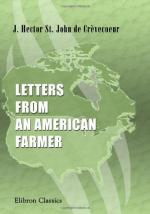The next wish of this traveller will be to know whence came all these people? they are a mixture of English, Scotch, Irish, French, Dutch, Germans, and Swedes. From this promiscuous breed, that race now called Americans have arisen. The eastern provinces must indeed be excepted, as being the unmixed descendants of Englishmen. I have heard many wish that they had been more intermixed also: for my part, I am no wisher, and think it much better as it has happened. They exhibit a most conspicuous figure in this great and variegated picture; they too enter for a great share in the pleasing perspective displayed in these thirteen provinces. I know it is fashionable to reflect on them, but I respect them for what they have done; for the accuracy and wisdom with which they have settled their territory; for the decency of their manners; for their early love of letters; their ancient college, the first in this hemisphere; for their industry; which to me who am but a farmer, is the criterion of everything. There never was a people, situated as they are, who with so ungrateful a soil have done more in so short a time. Do you think that the monarchical ingredients which are more prevalent in other governments, have purged them from all foul stains? Their histories assert the contrary.
In this great American asylum, the poor of Europe have by some means met together, and in consequence of various causes; to what purpose should they ask one another what countrymen they are? Alas, two thirds of them had no country. Can a wretch who wanders about, who works and starves, whose life is a continual scene of sore affliction or pinching penury; can that man call England or any other kingdom his country? A country that had no bread for him, whose fields procured him no harvest, who met with nothing but the frowns of the rich, the severity of the laws, with jails and punishments; who owned not




